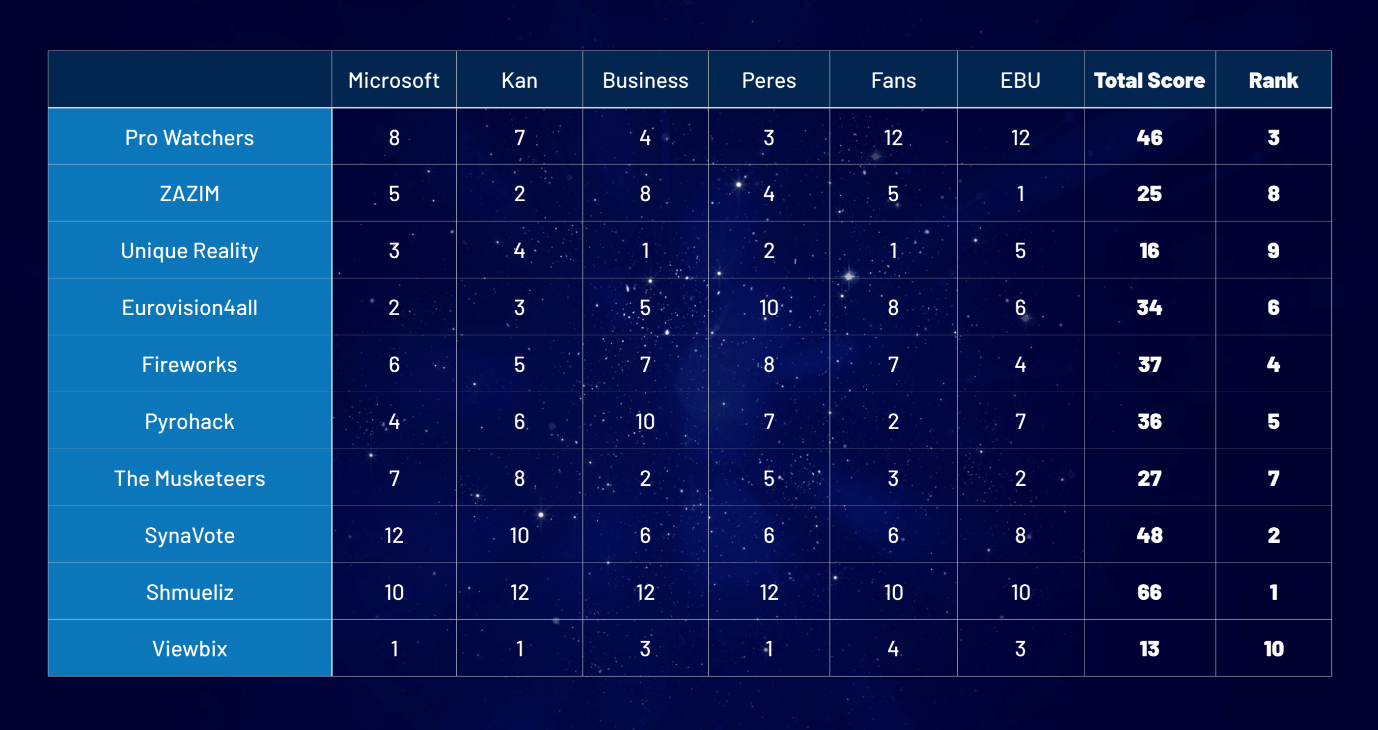Hackathon held ahead of Eurovision Song Contest in Israel
06 May 2019
The very first Eurovision Hackathon has taken place in Tel Aviv with the objective to develop new ways to access and enjoy the broadcast of the Eurovision Song Contest (ESC).
150 projects were presented at the EuroHack's two-day marathon, from teams of Israeli and international developers and start-ups. The event, initiated and led by BLEE Hackathons, took place at Microsoft's new Developer Hub in Tel Aviv on April 4 and 5.
The participants were set two challenges: "The Accessibility Challenge" which aims at developing accessibility means for watching and ranking the Eurovision broadcasts for people with disabilities, and "The Fans Challenge" which aims at upgrading the live viewing experience of the Eurovision Song Contest, to make it more social and entertaining.
Professional and technological mentors accompanied the teams in coming up with their solutions, and the EBU's Dmytro Petruk from Technology & Innovation also took part as mentor, providing the teams with valuable insights on the Eurovision Song Contest.
10 teams were selected to pitch their solutions in the Grand Final on April 29 with the chance to win tickets to this year’s event in Tel Aviv.
Those projects were judged in true Song Contest style (1-12 points) by different judging panels, including an EBU delegation composed of Jon Ola Sand (ESC Executive Supervisor), Nadja Burkhardt (Event Supervisor), and other members of the ESC core team.
FINALIST PROJECTS:
- Pyrohack: While not dealing with the viewers at home, Pyrohack’s solution turns the Eurovision viewers in the arena into a huge screen. Each viewer’s phone becomes a pixel in the big picture, and a smart algorithm determines the phone’s location based on its distance from the stage.
- ProWatchers: An app that allows Eurovision watchers to choose between thousands of commentators around the world. Viewers can get commentators' analysis and point of view on their TV screen and enrich their experience - all LIVE!
- Unique Real-ity: Never watch Eurovision alone! With a click of a button join live broadcast from people’s living rooms, bars, open watch parties. Cheer and enjoy the competition with people from all over the world from your own living room.
- Viewbix: Viewbix developed an interactive video player that scrapes and adds interesting data on top of the live broadcast. Learn about the singer, the country, get the lyrics or interesting statistics while watching the live entry.
- Fireworks: With this app, viewers can send emojis while watching the live performances, and then see what Europe is feeling about the song. You can see what each country is feeling, or different demographics, or even your groups of friends.
- Eurovision4all: A fun platform that enables interactions with the live broadcast - share your opinion, chat, answer trivia questions - and is also accessible for people with cognitive disabilities, enabling them to be part of the interactive fun.
- Ta'al Carmel 6000: People with cognitive disabilities often have trouble determining which country to vote for out of 20+ performances. The system collects the viewer’s support level during the song, uses the breaks to make choices, and in the end - provides a list of countries the viewer can vote for.
- Zazim: Cognitive disabilities sometimes mean not being able to discern different emotions conveyed while a song is performed. ZAZIM’s solution adds emojis on screen while the song is performed to help people with cognitive disabilities understand whether the song is happy, sad, angry, etc.
- Shmueliz: The most dramatic part of each ESC competition is the scoring - over 40 broadcasters deliver their judging scores live, followed by the points from the audience. However, for people with sight disabilities, it might prove hard to follow. The Shmueliz developed a system that analyzes the voting table and can provide information based on voice commands - who is in 5th place? Who just got the 7 points? etc.
- The Musketeers: The Musketeers’ solution turns the live music into animated shapes, with movement and colour, to help people with hearing impairments get and enjoy the music even without hearing.
The winning project was Shmueliz with 66 points. The whole score table can be found below. The EBU will explore the option to host more ESC hackathons in the future.






